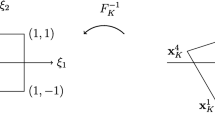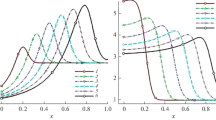Abstract.
In this paper, we describe recent developments in the design and implementation of Navier-Stokes solvers based on finite element discretization. The most important ingredients are residual driven a posteriori mesh refinement, fully coupled defect-correction iteration for linearization, and optimal multigrid preconditioning. These techniques were systematically developed for computing incompressible viscous flows in general domains. Recently they have been extended to compressible low-Mach flows involving chemical reactions. The potential of automatic mesh adaptation together with multilevel techniques is illustrated by several examples, (1) the accurate prediction of drag and lift coefficients, (2) the determination of CARS-signals of species concentration in flow reactors, (3) the computation of laminar flames.
Similar content being viewed by others
Author information
Authors and Affiliations
Additional information
Received: 30 April 1999 / Accepted: 17 June 1999
Rights and permissions
About this article
Cite this article
Becker, R., Braack, M., Rannacher, R. et al. Fast and reliable solution of the Navier–Stokes equations including chemistry. Comput Visual Sci 2, 107–122 (1999). https://doi.org/10.1007/s007910050033
Published:
Issue Date:
DOI: https://doi.org/10.1007/s007910050033




